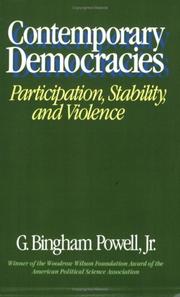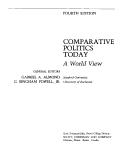| Listing 1 - 10 of 17 | << page >> |
Sort by
|

ISBN: 0300080158 0300080166 9780300080162 9780300080155 Year: 2000 Publisher: New Haven, Conn. Yale University Press
Abstract | Keywords | Export | Availability | Bookmark
 Loading...
Loading...Choose an application
- Reference Manager
- EndNote
- RefWorks (Direct export to RefWorks)
Government --- Political systems --- Elections --- Democracy --- Representative government and representation --- Majorities --- Proportional representation --- #SBIB:023.AANKOOP --- #SBIB:324H42 --- Politieke structuren: verkiezingen --- Parliamentary government --- Political representation --- Representation --- Self-government --- Constitutional history --- Constitutional law --- Political science --- Republics --- Suffrage --- Cumulative voting --- Representation, Proportional --- Voting, Cumulative --- Voting --- Minorities --- Electoral politics --- Franchise --- Polls --- Politics, Practical --- Plebiscite --- Political campaigns --- Equality --- Democracy. --- Elections. --- Majorities. --- Proportional representation. --- Representative government and representation.

ISBN: 0674166868 0674166876 Year: 1982 Publisher: Cambridge Harvard university
Abstract | Keywords | Export | Availability | Bookmark
 Loading...
Loading...Choose an application
- Reference Manager
- EndNote
- RefWorks (Direct export to RefWorks)
Comparative government --- Democracy --- Institutions politiques comparées --- Démocratie --- #SBIB:324H20 --- #SBIB:324H71 --- #SBIB:324H50 --- Self-government --- Political science --- Equality --- Representative government and representation --- Republics --- Comparative political systems --- Comparative politics --- Government, Comparative --- Political systems, Comparative --- Politologie: theorieën (democratie, comparatieve studieën….) --- Politieke verandering: modernisatie, democratisering, regional development --- Politieke participatie en legitimiteit (referenda, directe democratie, publieke opinie...) --- Institutions politiques comparées --- Démocratie
Book
ISBN: 1108699782 1108681123 1108595677 1108482147 1108742130 Year: 2019 Publisher: Cambridge : Cambridge University Press,
Abstract | Keywords | Export | Availability | Bookmark
 Loading...
Loading...Choose an application
- Reference Manager
- EndNote
- RefWorks (Direct export to RefWorks)
Ideological congruence is the term generally used in comparative politics for the representative relationship between the general preferences of citizens and the perceived and stated position of government. This study provides a systematic comparative assessment of success and failure in achieving ideological congruence in nineteen developed parliamentary democracies from 1996 through to 2017. It then deconstructs the processes through which elections can connect citizens and governments into the three major stages: citizens' votes in parliamentary elections; the conversion of those votes into legislative representation; the election of prime ministers by their parliaments and the appointment of cabinet ministers. Analyzing these three stages shows that average distance from the median citizen increases at each stage, with only a few remarkable recoveries once congruence begins to go astray.
Representative government and representation. --- Democracy. --- Proportional representation. --- Political parties --- Right and left (Political science) --- Left (Political science) --- Left and right (Political science) --- Right (Political science) --- Political science --- Party platforms, Political --- Platforms of political parties --- Political party platforms --- Political platforms --- Cumulative voting --- Representation, Proportional --- Voting, Cumulative --- Constitutional law --- Elections --- Representative government and representation --- Self-government --- Equality --- Republics --- Parliamentary government --- Political representation --- Representation --- Constitutional history --- Democracy --- Suffrage --- Platforms.
Book
Year: 1974 Publisher: Berkeley University of California. College of engineering
Abstract | Keywords | Export | Availability | Bookmark
 Loading...
Loading...Choose an application
- Reference Manager
- EndNote
- RefWorks (Direct export to RefWorks)
Book
Year: 1974 Publisher: Berkeley University of California. College of engineering
Abstract | Keywords | Export | Availability | Bookmark
 Loading...
Loading...Choose an application
- Reference Manager
- EndNote
- RefWorks (Direct export to RefWorks)
Book
ISBN: 9014020341 Year: 1972 Publisher: Alphen aan den Rijn Samsom
Abstract | Keywords | Export | Availability | Bookmark
 Loading...
Loading...Choose an application
- Reference Manager
- EndNote
- RefWorks (Direct export to RefWorks)
Political systems --- #SBIB:324H40 --- #SBIB:IO --- 321 --- Politieke systemen --- Politieke structuren: algemeen

ISBN: 067339705X Year: 1988 Publisher: Glenview, Ill. Scott, Foresman
Abstract | Keywords | Export | Availability | Bookmark
 Loading...
Loading...Choose an application
- Reference Manager
- EndNote
- RefWorks (Direct export to RefWorks)
Politics --- 32.001.36 --- Comparative government --- #SBIB:324H40 --- Comparative political systems --- Comparative politics --- Government, Comparative --- Political systems, Comparative --- Political science --- Vergelijkende politieke wetenschap --- Politieke structuren: algemeen --- Comparative government. --- 32.001.36 Vergelijkende politieke wetenschap
Book
Year: 1967 Publisher: Berkeley University of California. College of engineering
Abstract | Keywords | Export | Availability | Bookmark
 Loading...
Loading...Choose an application
- Reference Manager
- EndNote
- RefWorks (Direct export to RefWorks)
Book
Year: 1974 Publisher: Berkeley University of California. College of engineering
Abstract | Keywords | Export | Availability | Bookmark
 Loading...
Loading...Choose an application
- Reference Manager
- EndNote
- RefWorks (Direct export to RefWorks)
Book
Year: 1974 Publisher: Berkeley University of California. College of engineering
Abstract | Keywords | Export | Availability | Bookmark
 Loading...
Loading...Choose an application
- Reference Manager
- EndNote
- RefWorks (Direct export to RefWorks)
| Listing 1 - 10 of 17 | << page >> |
Sort by
|

 Search
Search Feedback
Feedback About UniCat
About UniCat  Help
Help News
News